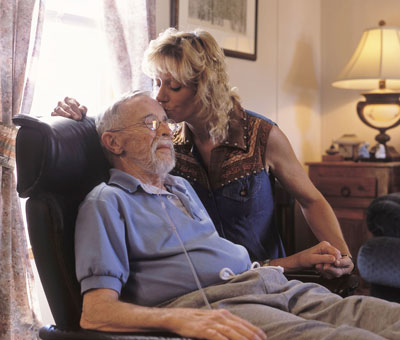
By Pete Sheehan
GRIEVING FOR a loved one can begin long before that loved one dies.
“I’ve said that the day they die is the day you cry, but it’s not the day that you lost them,” said Ralph Zerbonia, an entrepreneur from Youngstown, Ohio, who for years watched his mother, Gloria, decline through dementia.
“There is not even a certain date that you can cite where the loss takes place,” said Zerbonia. Before his mother’s illness, she was well known in her neighborhood and her parish for her outgoing, kind personality.
“I think the word that people used was ebullient,” he said.
As the disease progressed, she became angry, temperamental, demanding, Zerbonia said. She also couldn’t remember him or his brother.
Pam Bradley of South Bend, Ind., recalls her father’s decline from amyotrophic lateral sclerosis (ALS), also known as Lou Gehrig’s disease – a progressive neurodegenerative disease that affects nerve cells in the brain and spinal cord.
From her father’s diagnosis to his death, she found herself grieving “in baby steps.” The father that she and her brothers and sisters knew was vibrant and personable. He had kept active, even joining the YMCA as he grew older. Then he found himself experiencing unsteadiness on his feet. Later he began falling. His doctor diagnosed him with ALS and told him that he needed a walking stick. Eventually he couldn’t drive a car.
“I remember when he couldn’t take off his socks,” Bradley said, but he was proud when he found a way to push them off with his cane. Later, he needed a walker.
“At one point I remember realizing, he’s not going to be able to visit us again,’’ Bradley said. Even after he was confined to his bed, there were still new levels of grief.
“Dad was very friendly, and he loved to talk. His high school yearbook listed his nickname as ‘Joe the Jaw,’’’ Bradley said with an affectionate laugh. In time, he lost his ability to speak and was forced to communicate “with a strange spelling mechanism.’”
“At each point, you realize,” Bradley said, “it is not the same dad or the same grandpa.”
“I don’t think it is unusual for a caregiver or a family member to begin grieving long before the person dies,” said Bill Dodds of Mountlake Terrace, Wash. A veteran journalist, Dodds is co-founder and president of the Friends of St. John the Caregiver, an international Catholic organization for family caregivers. He and his late wife, Monica, for years wrote a Catholic News Service column on caring for an elderly parent.
He heard many stories through the years of how people coped with the health decline of a parent.
“They grieve losses along the way and the relationship changes. Every story is the same and every story is unique,” he said, noting that the reason for and the nature of the person’s decline and the individual family’s circumstances all make the experience different.
Yet, the reality of the loss is universal, he noted.
One husband he knows had a wife with Alzheimer’s disease who’d forgotten who her husband was. She was at a nursing home “and some- times would flirt with a male resident.”
The husband visited her daily and understood, Dodds said. “He wrote of her lovingly.”
Dodds’ knowledge of this subject also comes from personal experience. In the last year of his wife’s life as she battled cancer, he said he “had to gradually let go of things” – the trips they enjoyed, nightly walks and eventually, the ministry they practiced together.
He said the process “can be very lonely” as loved ones cope with the gradual losses. “It helps to know that there are others going through the same kind of experiences.”
